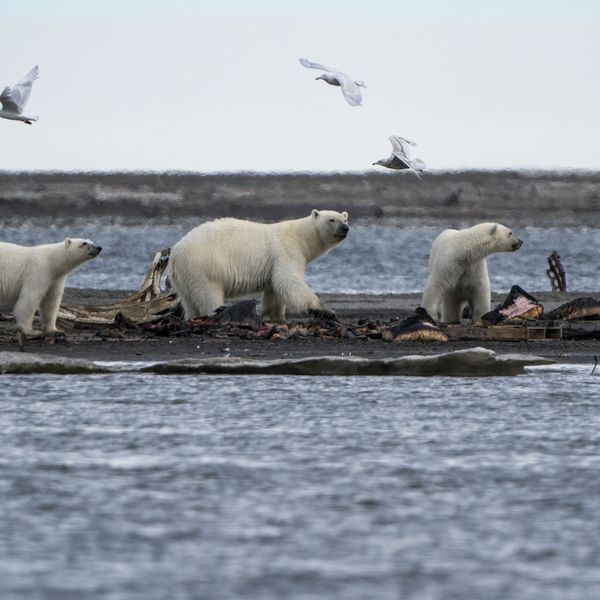Revealed: Big Oil's Backroom Lobby Blitz to Drill in Arctic...Again
The government of Canada, caving to oil industry pressure, is considering extending Arctic drilling leases
After the very public failure of a number of Arctic drilling attempts last year, Big Oil companies are lobbying the government of Canada to extend their drilling licenses and relinquish hundreds of millions in security deposits, reporting on Monday revealed.
The National Observer's Mike De Souza reports that the Trudeau administration is proceeding with a review of Canada's Petroleum Resources Act, which "internal federal briefing notes show" was initiated by the government of former Prime Minister Stephen Harper--a notorious "climate villain"--at the behest of oil industry lobbyists.
According to De Souza, as the law currently stands, companies including "Imperial Oil, Exxon Mobil Corp., BP Plc., and Chevron Corp. would be forced in the coming years to walk away from their proposed projects since they have not been able to convince federal authorities that they can drill for oil in the Arctic--before their licenses expire--without causing an environmental disaster."
Not only do those oil giants want an extension on their contracts, they are seeking repayment on the collective $500 million in security deposits to obtain those licenses--after they give Arctic drilling another shot.
"The changes to the law proposed by the oil industry lobbyists would allow them to extend exploration licenses beyond a maximum nine-year term so that they can pursue their projects without paying any new security deposits," De Souza reports. "At the same time, an extension of the licenses could allow companies to get refunds on the hundreds of millions of dollars that they already paid to the government, once they begin to drill for oil."
Further, the closed-door review is being conducted by Alberta-based attorney and former member of the National Energy Board Rowland Harrison, who was initially tapped by the Harper administration.
The fact that the entire process has been "a direct outcome of industry lobbying" raises "a lot of concerns that the review was slanted from the beginning," said Alex Speers-Roesch, Arctic campaigner for Greenpeace Canada, which obtained the internal federal correspondence through an access to information request.
Greenpeace Canada told National Observer that the changes sought by the oil industry amount to another fossil fuel subsidy, which Trudeau had promised to phase out during last year's campaign, and are incompatible with the government's climate goals.
Harrison has been meeting with Indigenous groups, industry representatives, environmentalist, and other stakeholders and is expected to deliver his recommendation on the law change by May 31.
An Urgent Message From Our Co-Founder
Dear Common Dreams reader, The U.S. is on a fast track to authoritarianism like nothing I've ever seen. Meanwhile, corporate news outlets are utterly capitulating to Trump, twisting their coverage to avoid drawing his ire while lining up to stuff cash in his pockets. That's why I believe that Common Dreams is doing the best and most consequential reporting that we've ever done. Our small but mighty team is a progressive reporting powerhouse, covering the news every day that the corporate media never will. Our mission has always been simple: To inform. To inspire. And to ignite change for the common good. Now here's the key piece that I want all our readers to understand: None of this would be possible without your financial support. That's not just some fundraising cliche. It's the absolute and literal truth. We don't accept corporate advertising and never will. We don't have a paywall because we don't think people should be blocked from critical news based on their ability to pay. Everything we do is funded by the donations of readers like you. Will you donate now to help power the nonprofit, independent reporting of Common Dreams? Thank you for being a vital member of our community. Together, we can keep independent journalism alive when it’s needed most. - Craig Brown, Co-founder |
After the very public failure of a number of Arctic drilling attempts last year, Big Oil companies are lobbying the government of Canada to extend their drilling licenses and relinquish hundreds of millions in security deposits, reporting on Monday revealed.
The National Observer's Mike De Souza reports that the Trudeau administration is proceeding with a review of Canada's Petroleum Resources Act, which "internal federal briefing notes show" was initiated by the government of former Prime Minister Stephen Harper--a notorious "climate villain"--at the behest of oil industry lobbyists.
According to De Souza, as the law currently stands, companies including "Imperial Oil, Exxon Mobil Corp., BP Plc., and Chevron Corp. would be forced in the coming years to walk away from their proposed projects since they have not been able to convince federal authorities that they can drill for oil in the Arctic--before their licenses expire--without causing an environmental disaster."
Not only do those oil giants want an extension on their contracts, they are seeking repayment on the collective $500 million in security deposits to obtain those licenses--after they give Arctic drilling another shot.
"The changes to the law proposed by the oil industry lobbyists would allow them to extend exploration licenses beyond a maximum nine-year term so that they can pursue their projects without paying any new security deposits," De Souza reports. "At the same time, an extension of the licenses could allow companies to get refunds on the hundreds of millions of dollars that they already paid to the government, once they begin to drill for oil."
Further, the closed-door review is being conducted by Alberta-based attorney and former member of the National Energy Board Rowland Harrison, who was initially tapped by the Harper administration.
The fact that the entire process has been "a direct outcome of industry lobbying" raises "a lot of concerns that the review was slanted from the beginning," said Alex Speers-Roesch, Arctic campaigner for Greenpeace Canada, which obtained the internal federal correspondence through an access to information request.
Greenpeace Canada told National Observer that the changes sought by the oil industry amount to another fossil fuel subsidy, which Trudeau had promised to phase out during last year's campaign, and are incompatible with the government's climate goals.
Harrison has been meeting with Indigenous groups, industry representatives, environmentalist, and other stakeholders and is expected to deliver his recommendation on the law change by May 31.
After the very public failure of a number of Arctic drilling attempts last year, Big Oil companies are lobbying the government of Canada to extend their drilling licenses and relinquish hundreds of millions in security deposits, reporting on Monday revealed.
The National Observer's Mike De Souza reports that the Trudeau administration is proceeding with a review of Canada's Petroleum Resources Act, which "internal federal briefing notes show" was initiated by the government of former Prime Minister Stephen Harper--a notorious "climate villain"--at the behest of oil industry lobbyists.
According to De Souza, as the law currently stands, companies including "Imperial Oil, Exxon Mobil Corp., BP Plc., and Chevron Corp. would be forced in the coming years to walk away from their proposed projects since they have not been able to convince federal authorities that they can drill for oil in the Arctic--before their licenses expire--without causing an environmental disaster."
Not only do those oil giants want an extension on their contracts, they are seeking repayment on the collective $500 million in security deposits to obtain those licenses--after they give Arctic drilling another shot.
"The changes to the law proposed by the oil industry lobbyists would allow them to extend exploration licenses beyond a maximum nine-year term so that they can pursue their projects without paying any new security deposits," De Souza reports. "At the same time, an extension of the licenses could allow companies to get refunds on the hundreds of millions of dollars that they already paid to the government, once they begin to drill for oil."
Further, the closed-door review is being conducted by Alberta-based attorney and former member of the National Energy Board Rowland Harrison, who was initially tapped by the Harper administration.
The fact that the entire process has been "a direct outcome of industry lobbying" raises "a lot of concerns that the review was slanted from the beginning," said Alex Speers-Roesch, Arctic campaigner for Greenpeace Canada, which obtained the internal federal correspondence through an access to information request.
Greenpeace Canada told National Observer that the changes sought by the oil industry amount to another fossil fuel subsidy, which Trudeau had promised to phase out during last year's campaign, and are incompatible with the government's climate goals.
Harrison has been meeting with Indigenous groups, industry representatives, environmentalist, and other stakeholders and is expected to deliver his recommendation on the law change by May 31.


